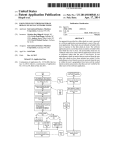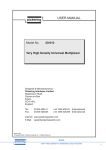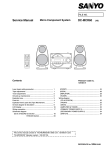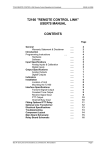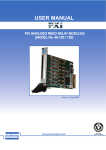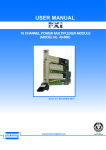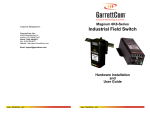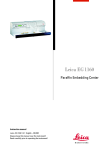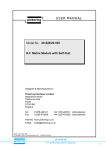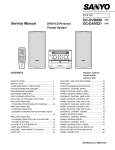Download USER MANUAL - TI E2E Community
Transcript
pickering USER MANUAL HIGH DENSITY PRECISION RESISTOR MODULE (MODEL No. 40-297) Issue 2.6 October 2011 pickering www.pickeringtest.com HIGH DENSITY PRECISION RESISTOR MODULE 40-297 ISO 9002 Reg No. FM38792 Page 1 pickering © COPYRIGHT (2011) PICKERING INTERFACES. ALL RIGHTS RESERVED. No part of this publication may be reproduced, transmitted, transcribed, translated or stored in any form, or by any means without the written permission of Pickering Interfaces. Technical details contained within this publication are subject to change without notice. Page ii HIGH DENSITY PRECISION RESISTOR MODULE 40-297 pickering TECHNICAL SUPPORT For Technical Support please contact Pickering Interfaces either by phone, fax, the website or via e-mail. WARRANTY All products manufactured by Pickering Interfaces are warranted against defective materials and workmanship for a period of two years, excluding PXI chassis, from the date of delivery to the original purchaser. Any product found to be defective within this period will, at the discretion of Pickering Interfaces be repaired or replaced. Products serviced and repaired outside of the warranty period are warranted for ninety days. Extended warranty and service are available. Please contact Pickering Interfaces by phone, fax, the website or via e-mail. ENVIRONMENTAL POLICY Pickering Interfaces operates under an environmental management system similar to ISO 14001. Pickering Interfaces strives to fulfil all relevant environmental laws and regulations and reduce wastes and releases to the environment. Pickering Interfaces aims to design and operate products in a way that protects the environment and the health and safety of its employees, customers and the public. Pickering Interfaces endeavours to develop and manufacture products that can be produced, distributed, used and recycled, or disposed of, in a safe and environmentally friendly manner. Observe the Electrical Hazard Warning detailed in Section 8. Observe the Electrostatic Sensitive Device Caution detailed in Section 8. Worldwide Technical Support and Product Information http://www.pickeringtest.com Pickering Interfaces Headquarters Stephenson Road Clacton-on-Sea CO15 4NL United Kingdom Tel: +44 (0)1255-687900 Fax: +44 (0)1255-425349 E-Mail: [email protected] Pickering Interfaces Inc. 2900 Northwest Vine Street Grants Pass Oregon 97526 USA Pickering Interfaces GmbH Johann-Karg-Straße 30 D-85540 Haar-Salmdorf Germany Pickering Interfaces AB Karl Nordströmsväg 31 432 53 Varberg Sweden Tel: +1 541 471 0700 Fax: +1 541 471 8828 E-Mail: [email protected] Tel: +49 89 125 953 160 Fax: +49 89 125 953 189 E-Mail: [email protected] Tel: +46 340-69 06 69 Fax: +46 340-69 06 68 E-Mail: [email protected] Pickering Interfaces Inc. (East Coast Regional Office) 12 Alfred Street Suite 300-3 Woburn Massachusetts 01801 USA Pickering Interfaces s.r.o. Smetanova 525 ˇ Trinec 739 61 Czech Republic Pickering Interfaces SARL 6 Rue De La Mare Blanche 77186 Noisiel Marne Le Vallee France Tel: +1 781 897 1710 Fax: +1 781 897 1701 E-mail: [email protected] Tel: +42 0558 339 168 Fax: +42 0558 340 888 E-mail: [email protected] Tel +33 1 60 53 55 50 Fax +33 1 60 53 55 99 email [email protected] HIGH DENSITY PRECISION RESISTOR MODULE 40-297 Page iii pickering THIS PAGE INTENTIONALLY BLANK Page iv HIGH DENSITY PRECISION RESISTOR MODULE 40-297 pickering CONTENTS Copyright Statement........................................................... ii Technical Support and Warranty........................................ iii Contents (this page)............................................................ v Section 1 Technical Specification....................................................... 1.1 Section 2 Technical Description......................................................... 2.1 Functional Description.................................................. 2.1 Guidance on Using the Module.................................... 2.2 Section 3 Installation............................................................................ 3.1 Hardware Installation.................................................... 3.1 Software Installation..................................................... 3.2 Soft Front Panel Installation......................................... 3.2 Section 4 Programming Guide............................................................ 4.1 Programming Options For Pickering PXI Cards........ 4.1 Module Architecture...................................................... 4.3 Using The Soft Front Panel.......................................... 4.5 Section 5 Connector Information........................................................ 5.1 Section 6 Trouble Shooting................................................................. 6.1 Section 7 Maintenance Information.................................................... 7.1 Software Update............................................................ 7.1 Verification & Adjustment Procedure.......................... 7.2 Verification Test Results............................................... 7.5 Relay Lookup Tables..................................................... 7.8 Section 8 Warnings and Cautions...................................................... 8.1 HIGH DENSITY PRECISION RESISTOR MODULE 40-297 Page v pickering THIS PAGE INTENTIONALLY BLANK Page vi HIGH DENSITY PRECISION RESISTOR MODULE 40-297 SECTION 1 - TECHNICAL SPECIFICATION pickering SECTION 1 - TECHNICAL SPECIFICATION 40-297 High Density Precision Resistor Module PRECISION RESISTOR 40-297 ● High Density Resistor Simulation ● Up To 18 Channels in a One Slot Module ● Short and Open Simulation ● Simple Software Control Through Resistance Calls ● VISA & Kernel Drivers Supplied for Windows 2000/XP/Vista ● Supported by PXI or LXI Chassis ● 2 Year Warranty The 40-297 provides a simple solution for applications requiring accurate simulation of resistive sensors. The 40-297 is available in a variety of resistance ranges and resolution capabilities that meet the needs of most functional test systems. It is particularly well suited to applications such as the testing of engine controllers where resistive sensors provide information on parameters such as temperature. Each channel of the 40-297 module is able to simulate the common short circuit and open circuit conditions that can be experienced in a system due to faulty wiring or sensors. Software control of the 40-297 is simplified by the use of simple resistor value calls. The module works out the channel setting closest to the requested value and sets that value. The user can interrogate the module to find the actual resistance setting used by the module. A calibration cable assembly is attached to the module to enable an external DMM to be connected to each channel in turn to support the process of verification. This considerably simplifies the effort required to check the module’s calibration. Verification is performed with the UUT disconnected from the module. The 40-297 is available in three standard builds - a narrow range 18 channel version, a medium range 9 channel version and a wide range 6 channel fine resolution version - that suit the most common configurations required. For applications requiring greater resolution and accuracy, or to support calibration with the UUT connected, users should consider the 40-260 series Precision resistor Modules. Up To 18 Switched Resistor 37-way D-type Plug Up To 18 ISSUE 2.5 OCT 2010 Offset Resistor Resistor Channel Connector Functional Diagram for the 40-297 High Density Precision Resistor Module PXI Switch & Instrumentation Pickering Interfaces www.pickeringtest.com HIGH DENSITY PRECISION RESISTOR MODULE 40-297 Page 1.1 SECTION 1 - TECHNICAL SPECIFICATION Specification Resistance Channels Model Number 40-297-001 40-297-002 Resistance Range 1Ω to 230Ω 2Ω to 13.5kΩ 3Ω to 1.5MΩ Setting Resolution 1Ω 0.25Ω 0.125Ω Number of Channels per Module 18 9 6 40-297-003 pickering Other Resistor Modules Pickering Interfaces manufacture a range of variable resistor modules in the PXI format. If you have a requirement for a variable resistor module please contact your local sales office with the information below and we will advise you on the best solution for your application. Lowest Resistance † Highest Resistance Resistance Resolution Overall Accuracy Maximum Power/Current Number of Channels (variable resistors) Accuracy: resolution ±0.2% † Resistance is as measured across the user connector terminals, minimum resistance must have a non-zero value. Fault Simulation: Open and short circuit (typically <0.3Ω) Product Order Codes Power: 0.5W maximum Temperature Stability: <50ppm Number of Operations: 100 million (10mA) Maximum Voltage: 100V or as limited by power Settling time: <3ms Software Control: By resistance calls to module for selected channel. Calibration: 4-wire resistance measurement of selected channel for verification purposes with UUT removed and a special cable assembly attached. Factory calibration data is stored in the module. 18 Channel Precision Resistor 9 Channel Precision Resistor 6 Channel Precision Resistor Power Requirements +3.3V +5V +12V -12V 0 4.3A max 0 0 40-297-001 40-297-002 40-297-003 Accessories: Calibration lead for 4-wire resistance measurement using DMM - 37-way D-type socket to shrouded 4mm bayonet plugs, 1Meter length 40-975-037-1M Mating Connectors & Cabling For connection accessories for the 40-297 please refer to the 90-007D 37 way D-type Connector Accessories data sheet where a complete list and documentation can be found for accessories, or refer to the Connection Solutions catalog. Physical Parameters Physical characteristics: One slot, 3U PXI. 3D models for all versions in a variety of popular file formats are available on request. PCI Interface: 33MHz, 32 bit address, 16 bit data. Signal Connectors: Male 37-way D-type Page 1.2 Pickering Interfaces are sponsor members of the PXI Systems Alliance www.pxisa.org HIGH DENSITY www.pickeringtest.com PRECISION RESISTOR MODULE 40-297 E-Mail [email protected] SECTION 1 - TECHNICAL SPECIFICATION pickering Programming Pickering provide kernel and VISA (NI and Agilent) drivers which are compatible with Windows 2000/XP/Vista operating systems. The VISA driver is also compatible with Real-Time Operating Systems such as LabVIEW RT. Additionally, QNX is fully supported, for other RTOS support contact Pickering. These drivers may be used with a variety of programming environments and applications including: National Instruments products (LabVIEW/LabWindows/ CVI/MAX/TestStand etc.) Microsoft Visual Studio products (Visual Basic/Visual C+) Agilent VEE Mathworks Matlab Drivers for popular Linux distributions are available, other environments are also supported, please contact Pickering with specific enquiries. PXI & CompactPCI Compliance The module is compliant with the PXI Specification 2.2. Local Bus, Trigger Bus and Star Trigger are not implemented. Uses 33MHz 32-bit backplane interface. Safety & CE Compliance All modules are fully CE compliant and meet applicable EU directives: Low-voltage safety EN61010-1:2001, EMC Immunity EN61000-6-1:2001, Emissions EN55011:1998. PXI & LXI Chassis Compatibility Compatible with all chassis conforming to the 3U PXI and 3U cPCI specification. Compatible with Legacy and Hybrid peripheral slots in a 3U PXI Express chassis. Compatible with Pickering Interfaces LXI Modular Switching chassis. For information on driving your switching solution in an LXI environment refer to the LXI Short Form Catalog. Operating/Storage Conditions Operating Temperature: Humidity: Altitude: 0°C to +55°C Up to 90% non-condensing 5000m Storage and Transport Conditions Storage Temperature: -20°C to +75°C Humidity: Up to 90% non-condensing Altitude: 15000m Please refer to the Pickering Interfaces “Connection Solutions” catalog for the full list of connector/cabling options, including drawings, photos and specifications. This is available in either print or as a download. Alternatively our web site has dynamically linked connector/ cabling options, including pricing, for all Pickering PXI modules. Latest Details Please refer to our Web Site for Latest Product Details. www.pickeringtest.com Refer to the “PXI Product Guide” for descriptions of Pickering Interfaces’ comprehensive range of PXI switching and instrumentation modules, including specifications and product selection guides. The Product Guide is available on request or can be downloaded from the Pickering website. Ever wondered what PXI is all about? Pickering Interfaces’ “PXImate” Explains the basics of PXI and provides useful data for engineers working on switch based test systems. The PXImate is available free on request from the Pickering website. The “PXI Product Catalog” gives full details of Pickering’s entire range of PXI switch modules, instrument modules and support products. The PXI Product Catalog is available on request or can be downloaded from the Pickering website. Pickering Interfaces are sponsor members of the PXI Systems Alliance www.pxisa.org www.pickeringtest.com E-Mail [email protected] HIGH DENSITY PRECISION RESISTOR MODULE 40-297 Page 1.3 © Copyright (2010) Pickering Interfaces. All Rights Reserved Pickering Interfaces maintains a commitment to continuous product development, consequently we reserve the right to vary from the description given in this data sheet. Operating Conditions SECTION 1 - TECHNICAL SPECIFICATION THIS PAGE INTENTIONALLY BLANK Page 1.4 HIGH DENSITY PRECISION RESISTOR MODULE 40-297 pickering SECTION 2 - TECHNICAL DESCRIPTION pickering SECTION 2 - TECHNICAL DESCRIPTION FUNCTIONAL DESCRIPTION A functional block diagram is provided in Figure 2.1. The Programmable Resistor Module is powered by +5V inputs via Compact PCI connector J1. The interface to the user test equipment is via the front panel mounted 37 way D type connector, J2. The module comprises two PCBs populated with resistor chains which are switched via dual pole relays. The two PCBs are connected via a plug and socket connector arrangement. The relays are energised via control signals from relay drivers which are addressed by PCI bridge U1, via the control logic. to output the required signal. Module configuration is determined by data stored in EEPROM U9 PCI Bridge U1 is configured by EEPROM U2. Each resistor chain includes an offset resistor that can be used to set the minimum resistance value as well as relay contacts to hold the channel open circuit or short circuit. 37-WAY D TYPE CONNECTOR J2 RELAY CONTACTS RELAY COILS COMPACT PCI BUS CONNECTOR J1 RELAY DRIVERS U17 TO U22 RESISTOR CHAINS TERMINATING RESISTORS R1 TO R12 PCI BRIDGE U1 CONTROL LOGIC U2 TO U8 +5V 0V MODULE CONFIGURATION U9 PCI BRIDGE CONFIGURATION U2 MOTHERBOARD RELAY CONTACTS RESISTOR CHAINS RELAY COILS RELAY DRIVERS U23 TO U28 DAUGHTERBOARD Figure 2.1 - Precision Programmable Resistor Module 40-297: Functional Block Diagram HIGH DENSITY PRECISION RESISTOR MODULE 40-297 Page 2.1 SECTION 2 - TECHNICAL DESCRIPTION pickering GUIDANCE ON USING THE MODULE The 40-297 behaves as a precise but adjustable in value resistor. The circuit elements in the design use switch resistors with electro-mechanical relays. It can be used to simulate the type of variable resistor found in many control systems that indicate the value of a parameter, such as temperature, strain or pressure. The 40-297 responds directly to a request for a particular value of resistance and is therefore very easy to use in a system. Applications programs are easily generated to convert, for example, temperature requests to resistance values for different types of RTD that are to be emulated. Each resistor channel has an “input” connection and an “output” connection. There is no significance in the label “input” and “output” other than to identify them. The resistor channel schematic is shown in Figure 2.2. RESISTOR CHANNEL CONNECTOR IN OUT CHANNEL 1 IN OUT CHANNEL 2 IN OUT CHANNEL 18 Figure 2.2 - Resistor Channels for 40-297 18-Channel Precision Programmable Resistor The module uses fixed resistor values switched by relays. There are no user adjustable parts A table containing calibration data is used to convert requests for specific resistance values to a setting which most closely corresponds to the value requested. The module contains two versions of the calibration table, one created by Pickering Interfaces at the point of manufacture and an alternate table which can be created by the user. The Pickering Interfaces table cannot be overwritten by the user. The user can select which table is being is used, in the majority of applications we recommend the Pickering Interfaces table is used, creation of a user table requires accurate measurements of many points within the module and requires a program to create with confidence. A program is available for this purpose from Pickering Interfaces but requires the use of a specific DMM range. For applications requiring the greatest accuracy Pickering Interfaces does offer a range of other resistor modules with better accuracy. Potentiometer Operation The 40-297 can be used to simulate a potentiometer by using the two channels connected in series. The user should decide on the value of the potentiometer to be simulated and program two channels so that the sum of their resistances is always the same. For example, if a 5kΩ potentiometer is needed with a wiper position at 1kΩ, set one channel to 1kΩ and the other to 4kΩ. Page 2.2 HIGH DENSITY PRECISION RESISTOR MODULE 40-297 SECTION 3 - INSTALLATION pickering SECTION 3 - INSTALLATION HARDWARE INSTALLATION CAUTION Electrostatic discharge can damage the components on the module. To avoid such damage in handling the board, touch the anti-static bag to a metal part of the chassis before removing the board from the bag. Ensure that there is adequate ventilation in accordance with the PXI Specification. The module should be installed in accordance with the following procedure: 1. Ensure that the system is turned OFF but still connected to mains so that it remains grounded. 2. Choose an appropriate slot in the rack. 3. Remove the blanking plate for the chosen slot. 4. Ensure that the injector/ejector handle is in its downward position. Align the module with the card guides on the top and bottom of the slot. WARNING: Do not raise the injector/ejector handle whilst inserting the module. The module will not insert properly unless the handle is in its downward position. 5. Hold the handle whilst slowly sliding the module into the card guides until the handle catches on the injector/ ejector rail (refer to Figure 3.1). 6. Raise the injector/ejector handle until the module firmly seats into the backplane. The front panel of the module should be flush with the front panel of the chassis. 7. Screw the front panel of the module to the front panel mounting rail. 8. In a system employing MXI-3 to connect a desktop PC to a PXI chassis or to link multiple chassis, power-up the system as follows: a. For a system comprising a PC and one chassis, power up the chassis before powering up the PC. b. For a system comprising more than one chassis, turn ON the last chassis in the system followed by the penultimate, etc, and finally turn ON the PC or chassis containing the system controller. 9. For Pickering Interfaces modular LXI installation there is no requirement to use any particular power up sequence. PXI / LXI Chassis Figure 3.1 - Installing the module into a PXI / cPCI / LXI Chassis HIGH DENSITY PRECISION RESISTOR MODULE 40-297 Page 3.1 SECTION 3 - INSTALLATION pickering SOFTWARE INSTALLATION First install the appropriate Pickering PXI switch card drivers by running the installer program Setup.exe, either from the CD-ROM supplied, or by downloading the latest version from our website http://www.pickeringtest.com - the recommended method. There are different versions of the Setup program to suit different Windows versions and software environments. Setup is accompanied by a ReadMe file containing additional installation information. A single installation covers all cards in the System 40, System 45 and System 50 ranges. When installation completes, the installed drivers’ ReadMe file is offered for display. It can also be displayed later using a shortcut on the Programs>>Pickering menu. If you are not a LabVIEW user you should choose the “full” version, and once that has been installed run the LabVIEW Runtime Engine installer via the shortcut on the Programs>>Pickering menu. In the absence of LabVIEW the Runtime Engine is required to support the Pickering Test Panels application. SOFT FRONT PANEL INSTALLATION The installation of the soft front panel utility is through a basic windows install package found on the distribution DVD. 1. Locate and run the installer package in the folder DVD:\Applications\Soft Front Panels. Run the installer Setup_40-26X-SFP.exe 2. Follow the on screen instructions, selecting a different target directory if required. It is recommended that it be installed to the default Pickering directory created during driver installation (usually C:\Pickering). 3. Once installed a new program group should be available on the Programs\Pickering menu location. This will install the soft front panel utility and the corresponding windows help file. To un-install, either use the windows Add/Remove Programs procedure or run the Uninstall 40-26X soft front panel menu item in Programs\Pickering\40-26X For instructions on how to operate the module via the Soft Front Panel, please refer to the end of Section 4 “Programming Guide” of this manual. Figure 3.2 - Soft Front Panel For The 40-297 Page 3.2 HIGH DENSITY PRECISION RESISTOR MODULE 40-297 SECTION 4 - PROGRAMMING GUIDE pickering SECTION 4 - PROGRAMMING GUIDE PROGRAMMING OPTIONS FOR PICKERING INTERFACES PXI CARDS Software drivers are supplied for Microsoft Windows 2000/XP operating systems, with specific support for the following development environments: ●● ●● ●● ●● Microsoft Visual Studio (VB, C++, C#) Borland C++ National Instruments LabWindows/CVI National Instruments LabVIEW and LabVIEW RT Windows drivers are supplied in the form of Dynamic Link Libraries, which should also be usable in any other development environment that supports them. Some recent drivers developed for the LXI platform are capable of addressing both PXI and LXI domains. Such duality may be of help to users considering future migration from PXI based systems to LXI based systems, or indeed systems containing both PXI and LXI components. Programming for PXI A number of different Windows drivers are available to meet particular system requirements, and should none of these be suitable there is also the option of register-level programming. Drivers are generally ‘universal’, handling all models in the System 40, 45 and 50 ranges; however some models that are not compliant with the Ivi Swtch class cannot be used with the pi40iv IVI driver. The pipx40 and Pilpxi drivers are also applicable to certain models in the System 41 (PXI Instruments) range - see these drivers’ System 41 support list. Please note that this documentation is available in its most up-to-date form as HTML help files, fully hyperlinked for easy access - both pipx40 and Pilpxi documents are included in the Pipx40vpp software installation. IVI Driver for Windows - pi40iv The pi40iv IVI (Interchangeable Virtual Instrument) driver supports all Pickering Interfaces PXI switch cards that are consistent with the Iviswtch class model - as are the great majority of cards in the System 40/45/50 ranges. It integrates well with LabWindows/CVI and LabVIEW, and is fully compatible with Switch Executive. It is also usable in general-purpose programming environments such as Visual C++ and Visual Basic. Prior installation of the VISA and IviEngine from National Instruments are required for the correct installation and operation of this driver. VISA Driver for Windows - pipx40 The pipx40 driver conforms to the VISA (Virtual Instrument Software Architecture) standard for programmable instrumentation. Instrument control environments such as LabVIEW and LabWindows/CVI are based on VISA, and pipx40 support libraries are provided for them. Prior installation of VISA from National Instruments is required for the operation of this driver. Where VISA is available, pipx40 can also be used in general-purpose programming environments such as Visual C++ and Visual Basic. When IVI is not a system requirement this driver will often yield faster operation than the pi40iv driver. Direct I/ODriver for Windows - Pilpxi The Pilpxi driver accesses cards directly, without using the VISA software layer, while offering similar overall functionality to pipx40. It is most commonly used in general-purpose programming environments such as Visual C++ and Visual Basic. Operating speed of the VISA and Direct I/O drivers is generally comparable. HIGH DENSITY PRECISION RESISTOR MODULE 40-297 Page 4.1 SECTION 4 - PROGRAMMING GUIDE pickering Register-level Programming Register level programming for this module is not available because of the hardware techniques and the firmware algorithms used to convert resistance calls into specific hardware instruction based on the calibration files stored in the module. Programming for LXI When Pickering PXI cards are inserted into an LXI Modular Chassis a different set of drivers is available. IVI Driver for Windows - pi40iv The pi40iv IVI also supports LXI inserted cards simply by changing the resource string to address string to the appropriate address. Direct I/ODriver for Windows - Piplx The piplx driver is based on the PXI Direct IO driver pilpxi, but with added functionality to deal with the added need to address the chassis using an IP address. It integrates well with LabWindows/CVI and LabVIEW, and is fully compatible with Switch Executive. It is also usable in general-purpose programming environments such as Visual C++ and Visual Basic. Please note that this driver may also be used in the PXI domain. If the addressed card is in the local computer PCI/ PXI system, commands will be passed through to the PXI Direct IO driver. This mechanism allows the piplx driver to be used for both PXI and LXI cards. The LXI format offers additional interface options not available in PXI : .NET A .NET native driver is also available. Once again this may be used for both LXI and PXI card control. SOAP Pickering LXI products include a SOAP interface which is usable from a wide variety of platforms and languages. SSH Pickering LXI products include an SSH interface which allows remote command line access to control cards, or, using a suitable package, programmatic control. The user is advised to visit the Pickering web site for further details of all the above drivers, where documentation, example programs, and further help with driver choice are available. LabVIEW, LabWindows/CVI and Switch Executive are trademarks of National Instruments Corporation. General Pickering Card Architecture With most drivers, before programming a Pickering card it is important to understand the basic architecture of Pickering cards. The switches on a Pickering card are organized into logical sub-units, each sub-unit containing a set of objects of similar type and use. These objects may be switches, digital outputs, digital inputs, resistors, power supplies etc, depending on the nature of the specific card. For example a simple matrix card will usually contain a single sub-unit containing the switches arranged in a 2-dimensional array. However a similar card with additional isolating relays connected to the matrix will contain additional sub-units containing those isolation relays. Low level drivers include functions to allow the programmer to query the card to ascertain the number of sub-units, and the size and type of each sub-unit. For full details of the driver functions available the programmer should refer to the documentation provided. Page 4.2 HIGH DENSITY PRECISION RESISTOR MODULE 40-297 SECTION 4 - PROGRAMMING GUIDE pickering MODULE ARCHITECTURE These resistor modules expose a total of 6, 9 or 18 sub-units as detailed below: Sub-Unit Size Sub-Unit Number Type 1 Use 40-297-001 40-297-002 40-297-003 Resistor 10 19 28 Resistor 1 2 Resistor 10 19 28 Resistor 2 3 Resistor 10 19 28 Resistor 3 4 Resistor 10 19 28 Resistor 4 5 Resistor 10 19 28 Resistor 5 6 Resistor 10 19 28 Resistor 6 7 Resistor 10 19 — Resistor 7 8 Resistor 10 19 — Resistor 8 9 Resistor 10 19 — Resistor 9 10 Resistor 10 — — Resistor 10 11 Resistor 10 — — Resistor 11 12 Resistor 10 — — Resistor 12 13 Resistor 10 — — Resistor 13 14 Resistor 10 — — Resistor 14 15 Resistor 10 — — Resistor 15 16 Resistor 10 — — Resistor 16 17 Resistor 10 — — Resistor 17 18 Resistor 10 — — Resistor 18 PROGRAMMING THE MODULE Resistance Control In practice the control of resistance is not performed by controlling of the sub-units directly but rather using the SetResistance() functions provided in the driver. In pilpxi: DWORD PIL_ResSetResistance(DWORD card, DWORD channel, DWORD Mode, double resistance) Or, in pipx40: ViStatus pipx40_resSetResistance(ViSession vi, ViUint32 subUnit, ViUInt32 mode, ViReal64 resistance) These functions accept a floating point value of resistance and calculate the appropriate settings of the sub-units required to achieve that resistance. To set short circuit (nominally zero ohms) use a floating point value of 0.0, and to set open circuit use a floating point value of “HUGE_VAL” (using C requires #include <math.h>, other languages should provide similar libraries). HIGH DENSITY PRECISION RESISTOR MODULE 40-297 Page 4.3 SECTION 4 - PROGRAMMING GUIDE pickering LabVIEW LabVIEW VIs are provided for the control of the resistance channels. Figure 4.1 - Example LabVIEW VI Supplied With The Precision Resistor Module Page 4.4 HIGH DENSITY PRECISION RESISTOR MODULE 40-297 SECTION 4 - PROGRAMMING GUIDE pickering USING THE SOFT FRONT PANEL Figure 4.2 - Example Soft Front Panel Supplied With The Precision Resistor Modules Resistor Channels To control a card, first press the ‘Find Cards’ button to locate all suitable resistor cards in the PCI/PXI system. Select the required card from the pull-down list then press the ‘Connect’ button to establish a control session on the selected card. There are buttons on the right hand side of the soft front panel, one for each of the card’s programmable resistor channels, select the required resistor tab. The coarse control allows the resistor to be set to a precision of 1Ω between the minimum and maximum values. The fine control offers a range of +/- 1Ω with a precision of 0.01Ω. These rotary controls may be operated using the mouse, however for closer control, the keyboard ‘Page Up’ and ‘Page Down’ keys will change the setting by 100Ω and 50mΩ respectively. The keyboard up-arrow and down-arrow keys will change the setting by 1Ω and 10mΩ respectively. Three ‘radio buttons’ on the SFP allow the currently selected resistor element to be set as open circuit, short circuit or the displayed resistance value. In the SFP ‘File’ menu, there are options to save and load card settings to file. Note: The “Voltage Reference” pull-down list and the “Monitor” control buttons on the right hand side of the SFP are not applicable to the 40-297 module. HIGH DENSITY PRECISION RESISTOR MODULE 40-297 Page 4.5 SECTION 4 - PROGRAMMING GUIDE THIS PAGE INTENTIONALLY BLANK Page 4.6 HIGH DENSITY PRECISION RESISTOR MODULE 40-297 pickering SECTION 5 - CONNECTOR INFORMATION pickering SECTION 5 - CONNECTOR INFORMATION CH1 IN 20 CH2 IN 21 CH3 IN CH4 IN CH5 IN CH6 IN CH7 IN CH8 IN CH9 IN CH10 IN CH11 IN CH12 IN 22 23 24 25 26 27 28 29 30 31 CH13 IN 32 CH14 IN 33 CH15 IN 34 CH16 IN CH17 IN CH18 IN 35 36 37 1 CH1 OUT 2 CH2 OUT 3 CH3 OUT 4 CH4 OUT 5 CH5 OUT 6 CH6 OUT 7 CH7 OUT 8 CH8 OUT 9 CH9 OUT 10 CH10 OUT 11 CH11 OUT 12 CH12 OUT 13 CH13 OUT 14 CH14 OUT 15 CH15 OUT 16 CH16 OUT 17 CH17 OUT 18 CH18 OUT 19 FP_GND Figure 5.1 - Pin Outs: 18-Channel Precision Resistor Module 40-297-001 (37-pin male D-type) CH1 IN 20 NC 21 CH2 IN 22 NC 23 CH3 IN 24 NC 25 CH4 IN 26 NC 27 CH5 IN 28 NC 29 CH6 IN 30 NC 31 CH7 IN 32 NC 33 CH8 IN 34 NC 35 CH9 IN 36 NC 37 1 NC 2 CH1 OUT 3 NC 4 CH2 OUT 5 NC 6 CH3 OUT 7 NC 8 CH4 OUT 9 NC 10 CH5 OUT 11 NC 12 CH6 OUT 13 NC 14 CH7 OUT 15 NC 16 CH8 OUT 17 NC 18 CH9 OUT 19 FP_GND Figure 5.2 - Pin Outs: 9-Channel Precision Resistor Module 40-297-002 (37-pin male D-type) HIGH DENSITY PRECISION RESISTOR MODULE 40-297 Page 5.1 SECTION 5 - CONNECTOR INFORMATION CH1 IN 20 NC 21 NC 22 CH2 IN 23 NC 24 NC 25 CH3 IN 26 NC 27 NC 28 CH4 IN 29 NC 30 NC 31 CH5 IN 32 NC 33 NC 34 CH6 IN 35 NC 36 NC 37 pickering 1 NC 2 NC 3 CH1 OUT 4 NC 5 NC 6 CH2 OUT 7 NC 8 NC 9 CH3 OUT 10 NC 11 NC 12 CH4 OUT 13 NC 14 NC 15 CH5 OUT 16 NC 17 NC 18 CH6 OUT 19 FP_GND Figure 5.3 - Pin Outs: 6-Channel Precision Resistor Module 40-297-003 (37-pin male D-type) Page 5.2 HIGH DENSITY PRECISION RESISTOR MODULE 40-297 SECTION 6 - TROUBLE SHOOTING pickering SECTION 6 - TROUBLESHOOTING INSTALLATION PROBLEMS The Plug & Play functionality of Pickering switch cards generally ensures trouble-free installation. If you do experience any installation problems you should first ensure that all cards are properly seated in their slots. Improperly mated cards may go undetected by the operating system, or may be detected as a card of an unknown type. They can also cause the computer to freeze at various stages in the boot sequence. If your system employs MXI-3 you should check the integrity of all MXI-3 links. When the system is powered up, and during Windows start-up, you should expect to see periodic activity on the MXI-3 RX/TX (yellow) indicators, clearing to leave only the PWR/LNK (green) LEDs illuminated. The RX/TX indicators should show activity when you attempt to access a card. DIAGNOSTIC UTILITY The Pickering Diagnostic Utility (accessible through the Programs>>Pickering>>PXI Utilities menu) generates a diagnostic report of the system’s PCI configuration, highlighting any potential configuration problems. Specific details of all installed Pickering switch cards are included. All the installed Pickering switch cards should be listed in the “Pilpxi information” section - if one or more cards is missing it may be possible to determine the reason by referring to the PCI configuration dump contained in the report, but interpretation of this information is far from straightforward, and the best course is to contact Pickering support: [email protected], if possible including a copy of the diagnostic report. In the “VISA information” section, if VISA is not installed it’s absence will be reported. This does not affect operation using the Direct I/O driver, and is not a problem unless you wish to use VISA. VISA is a component of National Instruments LabWindows/CVI and LabVIEW, or is available as a standalone environment. If VISA is present and is of a sufficiently recent version, the section “Pipx40 information” should present a listing similar to “Pilpxi information”. Please note that the Diagnostic Utility cannot access cards if they are currently opened by some other application, such as the Test Panels or Terminal Monitor. HIGH DENSITY PRECISION RESISTOR MODULE 40-297 Page 6.1 SECTION 6 - TROUBLE SHOOTING THIS PAGE INTENTIONALLY BLANK Page 6.2 HIGH DENSITY PRECISION RESISTOR MODULE 40-297 pickering SECTION 7 - MAINTENANCE INFORMATION pickering SECTION 7 - MAINTENANCE INFORMATION SOFTWARE UPDATE For PXI modules operating in a PXI chassis, no module software updates are required. For the latest version of the driver please refer to our web site www.pickeringtest.com where links to our Software Download page will provide the latest version of the driver software for the various programming environments encountered. For PXI modules which are supported in one of Pickering Interfaces’ Modular LXI Chassis (such as the 60-102 and 60-103) no module software update is required. If the module was introduced after the LXI chassis was manufactured the module may not be recognized, in this case the chassis firmware may need upgrading. This is a simple process which is described in the manual for the Modular LXI Chassis. HIGH DENSITY PRECISION RESISTOR MODULE 40-297 Page 7.1 SECTION 7 - MAINTENANCE INFORMATION pickering VERIFICATION & ADJUSTMENT PROCEDURE This section provides a procedure for verifying that the 40-297 is performing to specification and guidance on adjustment. In normal use the 40-297 does not require regular adjustment. Where procedures require regular verification checks of instrumentation in a system Pickering Interfaces recommend a 1 year interval between tests. In many applications much longer calibration intervals can be used. Verification Depending on the customer’s requirements a verification check can be made periodically by connecting to the front panel resistor channel port to check the module is within specification. The module has an internal date counter that shows a message in the diagnostics after this time but will not effect the cards operation. The customer has the option to read and reset the verification/calibration date as required via the following programming functions: PIL_ReadCalDate PIL_WriteCalDate The module also has two internal calibration stores User_Store & Factory_Store which contain the same calibration information when leaving the factory. Resistance calls are made using the calibration values in the User_Store, in nearly all cases no changes to either store will be required, if the User_Store is accidently modified the Factory_ Store can be copied to the User_Store to recover the factory calibration. Page 7.2 HIGH DENSITY PRECISION RESISTOR MODULE 40-297 SECTION 7 - MAINTENANCE INFORMATION pickering Verification Procedure The verification procedure is describes a set of measurements that is adequate to check that the module is performing to specification. Calibration/verification of the 40-297 requires the use of a precision DMM capable of 4 terminal resistance measurements. Measurement of the 40-297 can be simplified by use of the cable assembly shown in Fig 7.3. connected to the DMM. 6½ Digit DMM 40-297 CH1 IN CH2 IN CH3 IN CH4 IN CH5 IN CH6 IN CH7 IN CH8 IN CH9 IN CH10 IN CH11 IN CH12 IN CH13 IN CH14 IN CH15 IN CH16 IN CH17 IN CH18 IN 20 21 22 23 24 25 26 27 28 29 30 31 32 33 34 35 36 37 1 2 3 4 5 6 7 8 9 10 11 12 13 14 15 16 17 18 CH1 OUT CH2 OUT CH3 OUT CH4 OUT CH5 OUT CH6 OUT CH7 OUT CH8 OUT CH9 OUT CH10 OUT CH11 OUT CH12 OUT CH13 OUT CH14 OUT CH15 OUT CH16 OUT CH17 OUT CH18 OUT V,Ω+ I+ V,Ω- I- Calibration Cable 40-975-037-1M Figure 7.1 - Calibration of the 40-297 using a DMM with 4-wire resistance measurement and the 40-975-037-1M cable Each “input” and each “output” is linked together so all the installed channels are in parallel. Once connected in this way, the user can check each channel of the module in turn by setting all channels to the open position except for the single channel to be measured. The DMM is then used to measure the resistance with the module settings shown in Table 7.1 for each channel. The resistance settings are model dependent as shown. HIGH DENSITY PRECISION RESISTOR MODULE 40-297 Page 7.3 SECTION 7 - MAINTENANCE INFORMATION pickering Table 7.1 - Calibration Resistance Settings For Each Model 40-297-001 40-297-002 40-297-003 Short (0Ω) Short (0Ω) Short (0Ω) 1Ω 2Ω 3Ω 1.5Ω 2.15Ω 3.06Ω 2.5Ω 2.4Ω 3.2Ω 3.5Ω 2.75Ω 3.375Ω 7.5Ω 3.75Ω 4.875Ω 15.5Ω 5.75Ω 5.875Ω 31.5Ω 9.75Ω 7.875Ω 63.5Ω 17.75Ω 11.875Ω 127.5Ω 33.75Ω 19.875Ω 230Ω 65.75Ω 35.875Ω — 129.75Ω 67.875Ω — 256Ω 128Ω — 512Ω 256Ω — 1024Ω 512Ω — 2048Ω 1024Ω — 4096Ω 2048Ω — 8000Ω 4096Ω — 13500Ω 8000Ω — — 16000Ω — — 32000Ω — — 64000Ω — — 128000Ω — — 256000Ω — — 512000Ω — — 1024000Ω — — 1500000Ω For convenience, Tables 7.2, 7.3 and 7.4 on the following pages are provided for a means of recording calibration results for one channel of each model. Adjustment Procedure The 40-297 contains no user adjustable parts, it uses a calibration table that is used to allow the module to respond to requests for specific values of resistance. Two tables are supported, a factory table and a user table. For normal use we recommend that only the factory table is used. For applications requiring better accuracy we suggest using one of the 40-260 series modules. Although it is possible to modify the calibration table we recommend that modifications to calibration information is carried out by Pickering Interfaces. Calibration table alterations are only normally required in the event of having to replace a resistor. Page 7.4 HIGH DENSITY PRECISION RESISTOR MODULE 40-297 SECTION 7 - MAINTENANCE INFORMATION pickering VERIFICATION TEST RESULTS Table 7.2 - Calibration Test Results For 40-297-001 Serial Number: Channel Number: Date of Test: Operator’s Name: Test Equipment Used: Resistance Setting Measured Value Specification Limit, 0.2% ±1Ω Max Min Result (delete as appropriate) Short (0Ω) <.5Ω 0Ω Pass / Fail 1Ω 2.002Ω 0Ω Pass / Fail 1.5Ω 2.503Ω 0.497Ω Pass / Fail 2.5Ω 3.505Ω 1.495Ω Pass / Fail 3.5Ω 4.507Ω 2.493Ω Pass / Fail 7.5Ω 8.515Ω 6.485Ω Pass / Fail 15.5Ω 16.531Ω 14.469Ω Pass / Fail 31.5Ω 32.563Ω 30.437Ω Pass / Fail 63.5Ω 64.627Ω 62.373Ω Pass / Fail 127.5Ω 128.755Ω 126.245Ω Pass / Fail 230Ω 231.46Ω 228.54Ω Pass / Fail HIGH DENSITY PRECISION RESISTOR MODULE 40-297 Page 7.5 SECTION 7 - MAINTENANCE INFORMATION pickering Table 7.3 - Calibration Test Results For 40-297-002 Serial Number: Channel Number: Date of Test: Operator’s Name: Test Equipment Used: Resistance Setting Measured Value Specification Limit, 0.2% ±0.25Ω Max Min Result (delete as appropriate) Short (0Ω) <.5Ω 0Ω Pass / Fail 2Ω 2.254Ω 1.746Ω Pass / Fail 2.15Ω 2.4043Ω 1.8957Ω Pass / Fail 2.4Ω 2.6548Ω 2.1452Ω Pass / Fail 2.75Ω 3.0055Ω 2.4945Ω Pass / Fail 3.75Ω 4.0075Ω 3.4925Ω Pass / Fail 5.75Ω 6.0115Ω 5.4885Ω Pass / Fail 9.75Ω 10.0195Ω 9.4805Ω Pass / Fail 17.75Ω 18.0355Ω 17.4645Ω Pass / Fail 33.75Ω 34.0675Ω 33.4325Ω Pass / Fail 65.75Ω 66.1315Ω 65.3685Ω Pass / Fail 129.75Ω 130.2595Ω 129.2405Ω Pass / Fail 256Ω 256.762Ω 255.238Ω Pass / Fail 512Ω 513.274Ω 510.726Ω Pass / Fail 1024Ω 1026.298Ω 1021.702Ω Pass / Fail 2048Ω 2052.346Ω 2043.654Ω Pass / Fail 4096Ω 4104.442Ω 4087.558Ω Pass / Fail 8000Ω 8016.25Ω 7983.75Ω Pass / Fail 13500Ω 13527.25Ω 13472.75Ω Pass / Fail Page 7.6 HIGH DENSITY PRECISION RESISTOR MODULE 40-297 SECTION 7 - MAINTENANCE INFORMATION pickering Table 7.4 - Calibration Test Results For 40-297-003 Serial Number: Channel Number: Date of Test: Operator’s Name: Test Equipment Used: Resistance Setting Measured Value Specification Limit, 0.2% ±0.125Ω Max Min Result (delete as appropriate) Short (0Ω) <.5Ω 0Ω Pass / Fail 3Ω 3.131Ω 2.869Ω Pass / Fail 3.06Ω 3.19112Ω 2.92888Ω Pass / Fail 3.2Ω 3.3314Ω 3.0686Ω Pass / Fail 3.375Ω 3.50675Ω 3.24325Ω Pass / Fail 4.875Ω 5.00975Ω 4.74025Ω Pass / Fail 5.875Ω 6.01175Ω 5.73825Ω Pass / Fail 7.875Ω 8.01575Ω 7.73425Ω Pass / Fail 11.875Ω 12.02375Ω 11.72625Ω Pass / Fail 19.875Ω 20.03975Ω 19.71025Ω Pass / Fail 35.875Ω 36.07175Ω 35.67825Ω Pass / Fail 67.875Ω 68.13575Ω 67.61425Ω Pass / Fail 128Ω 128.381Ω 127.619Ω Pass / Fail 256Ω 256.637Ω 255.363Ω Pass / Fail 512Ω 513.149Ω 510.851Ω Pass / Fail 1024Ω 1026.173Ω 1021.827Ω Pass / Fail 2048Ω 2052.221Ω 2043.779Ω Pass / Fail 4096Ω 4104.317Ω 4087.683Ω Pass / Fail 8000Ω 8016.125Ω 7983.875Ω Pass / Fail 16000Ω 16032.125Ω 15967.875Ω Pass / Fail 32000Ω 32064.125Ω 31935.875Ω Pass / Fail 64000Ω 64128.125Ω 63871.875Ω Pass / Fail 128000Ω 128256.125Ω 127743.875Ω Pass / Fail 256000Ω 256512.125Ω 255487.875Ω Pass / Fail 512000Ω 513024.125Ω 510975.875Ω Pass / Fail 1024000Ω 1026048.125Ω 1021951.875Ω Pass / Fail 1500000Ω 1503000.125Ω 1496999.875Ω Pass / Fail HIGH DENSITY PRECISION RESISTOR MODULE 40-297 Page 7.7 SECTION 7 - MAINTENANCE INFORMATION pickering RELAY LOOK-UP TABLES The following pages provide a cross reference between the programmable bits for each channel of the Precision Resistor Module and the physical relays on the mother and daughter PCBs. These tables can be used in the fault finding process and should be used in conjunction with the PCB layout diagrams in Figures7.2 and 7.3 to identify the position of faulty relays. 18-Channel 8-Bit Precision Resistor Module (40-297-001) Chan. Use Relay Chan. Use Relay Chan. Use Relay Chan. Use Relay 1 Bit 1 RL1 5 Bit 6 RL46 10 Bit 1 RL91 14 Bit 6 RL136 1 Bit 2 RL2 5 Bit 7 RL47 10 Bit 2 RL92 14 Bit 7 RL137 1 Bit 3 RL3 5 Bit 8 RL48 10 Bit 3 RL93 14 Bit 8 RL138 1 Bit 4 RL4 5 Short RL49 10 Bit 4 RL94 14 Short RL139 1 Bit 5 RL5 5 Isolation RL50 10 Bit 5 RL95 14 Isolation RL140 1 Bit 6 RL6 6 Bit 1 RL51 10 Bit 6 RL96 15 Bit 1 RL141 1 Bit 7 RL7 6 Bit 2 RL52 10 Bit 7 RL97 15 Bit 2 RL142 1 Bit 8 RL8 6 Bit 3 RL53 10 Bit 8 RL98 15 Bit 3 RL143 1 Short RL9 6 Bit 4 RL54 10 Short RL99 15 Bit 4 RL144 1 Isolation RL10 6 Bit 5 RL55 10 Isolation RL100 15 Bit 5 RL145 2 Bit 1 RL11 6 Bit 6 RL56 11 Bit 1 RL101 15 Bit 6 RL146 2 Bit 2 RL12 6 Bit 7 RL57 11 Bit 2 RL102 15 Bit 7 RL147 2 Bit 3 RL13 6 Bit 8 RL58 11 Bit 3 RL103 15 Bit 8 RL148 2 Bit 4 RL14 6 Short RL59 11 Bit 4 RL104 15 Short RL149 2 Bit 5 RL15 6 Isolation RL60 11 Bit 5 RL105 15 Isolation RL150 2 Bit 6 RL16 7 Bit 1 RL61 11 Bit 6 RL106 16 Bit 1 RL151 2 Bit 7 RL17 7 Bit 2 RL62 11 Bit 7 RL107 16 Bit 2 RL152 2 Bit 8 RL18 7 Bit 3 RL63 11 Bit 8 RL108 16 Bit 3 RL153 2 Short RL19 7 Bit 4 RL64 11 Short RL109 16 Bit 4 RL154 2 Isolation RL20 7 Bit 5 RL65 11 Isolation RL110 16 Bit 5 RL155 3 Bit 1 RL21 7 Bit 6 RL66 12 Bit 1 RL111 16 Bit 6 RL156 3 Bit 2 RL22 7 Bit 7 RL67 12 Bit 2 RL112 16 Bit 7 RL157 3 Bit 3 RL23 7 Bit 8 RL68 12 Bit 3 RL113 16 Bit 8 RL158 3 Bit 4 RL24 7 Short RL69 12 Bit 4 RL114 16 Short RL159 3 Bit 5 RL25 7 Isolation RL70 12 Bit 5 RL115 16 Isolation RL160 3 Bit 6 RL26 8 Bit 1 RL71 12 Bit 6 RL116 17 Bit 1 RL161 3 Bit 7 RL27 8 Bit 2 RL72 12 Bit 7 RL117 17 Bit 2 RL162 3 Bit 8 RL28 8 Bit 3 RL73 12 Bit 8 RL118 17 Bit 3 RL163 3 Short RL29 8 Bit 4 RL74 12 Short RL119 17 Bit 4 RL164 3 Isolation RL30 8 Bit 5 RL75 12 Isolation RL120 17 Bit 5 RL165 4 Bit 1 RL31 8 Bit 6 RL76 13 Bit 1 RL121 17 Bit 6 RL166 4 Bit 2 RL32 8 Bit 7 RL77 13 Bit 2 RL122 17 Bit 7 RL167 4 Bit 3 RL33 8 Bit 8 RL78 13 Bit 3 RL123 17 Bit 8 RL168 4 Bit 4 RL34 8 Short RL79 13 Bit 4 RL124 17 Short RL169 4 Bit 5 RL35 8 Isolation RL80 13 Bit 5 RL125 17 Isolation RL170 4 Bit 6 RL36 9 Bit 1 RL81 13 Bit 6 RL126 18 Bit 1 RL171 4 Bit 7 RL37 9 Bit 2 RL82 13 Bit 7 RL127 18 Bit 2 RL172 4 Bit 8 RL38 9 Bit 3 RL83 13 Bit 8 RL128 18 Bit 3 RL173 4 Short RL39 9 Bit 4 RL84 13 Short RL129 18 Bit 4 RL174 4 Isolation RL40 9 Bit 5 RL85 13 Isolation RL130 18 Bit 5 RL175 5 Bit 1 RL41 9 Bit 6 RL86 14 Bit 1 RL131 18 Bit 6 RL176 5 Bit 2 RL42 9 Bit 7 RL87 14 Bit 2 RL132 18 Bit 7 RL177 5 Bit 3 RL43 9 Bit 8 RL88 14 Bit 3 RL133 18 Bit 8 RL178 5 Bit 4 RL44 9 Short RL89 14 Bit 4 RL134 18 Short RL179 5 Bit 5 RL45 9 Isolation RL90 14 Bit 5 RL135 18 Isolation RL180 Page 7.8 HIGH DENSITY PRECISION RESISTOR MODULE 40-297 SECTION 7 - MAINTENANCE INFORMATION pickering 9-Channel 16-Bit Precision Resistor Module (40-297-002) Chan. Use Relay Chan. Use Relay Chan. Use Relay Chan. Use Relay 1 Bit 1 RL1 3 Bit 6 RL46 1 Bit 2 RL2 3 Bit 7 RL47 5 Bit 9 RL91 7 Bit 14 RL136 5 Bit 10 RL92 7 Bit 15 RL137 1 Bit 3 RL3 3 Bit 8 RL48 1 Bit 4 RL4 3 Short RL49 5 Bit 11 RL93 7 Bit 16 RL138 5 Bit 12 RL94 7 Short 1 Bit 5 RL5 3 Isolation RL139 RL50 5 Bit 13 RL95 — — 1 Bit 6 RL6 3 RL140 Bit 9 RL51 5 Bit 14 RL96 8 Bit 1 RL141 1 Bit 7 RL7 1 Bit 8 RL8 3 Bit 10 RL52 5 Bit 15 RL97 8 Bit 2 RL142 3 Bit 11 RL53 5 Bit 16 RL98 8 Bit 3 1 Short RL143 RL9 3 Bit 12 RL54 5 Short RL99 8 Bit 4 1 Isolation RL144 RL10 3 Bit 13 RL55 — — RL100 8 Bit 5 RL145 1 Bit 9 RL11 3 Bit 14 RL56 6 Bit 1 RL101 8 Bit 6 RL146 1 Bit 10 RL12 3 Bit 15 RL57 6 Bit 2 RL102 8 Bit 7 RL147 1 Bit 11 RL13 3 Bit 16 RL58 6 Bit 3 RL103 8 Bit 8 RL148 1 Bit 12 RL14 3 Short RL59 6 Bit 4 RL104 8 Short RL149 1 Bit 13 RL15 — — RL60 6 Bit 5 RL105 8 Isolation RL150 1 Bit 14 RL16 4 Bit 1 RL61 6 Bit 6 RL106 8 Bit 9 RL151 1 Bit 15 RL17 4 Bit 2 RL62 6 Bit 7 RL107 8 Bit 10 RL152 1 Bit 16 RL18 4 Bit 3 RL63 6 Bit 8 RL108 8 Bit 11 RL153 1 Short RL19 4 Bit 4 RL64 6 Short RL109 8 Bit 12 RL154 — — RL20 4 Bit 5 RL65 6 Isolation RL110 8 Bit 13 RL155 2 Bit 1 RL21 4 Bit 6 RL66 6 Bit 9 RL111 8 Bit 14 RL156 2 Bit 2 RL22 4 Bit 7 RL67 6 Bit 10 RL112 8 Bit 15 RL157 2 Bit 3 RL23 4 Bit 8 RL68 6 Bit 11 RL113 8 Bit 16 RL158 2 Bit 4 RL24 4 Short RL69 6 Bit 12 RL114 8 Short RL159 2 Bit 5 RL25 4 Isolation RL70 6 Bit 13 RL115 — — RL160 2 Bit 6 RL26 4 Bit 9 RL71 6 Bit 14 RL116 9 Bit 1 RL161 2 Bit 7 RL27 4 Bit 10 RL72 6 Bit 15 RL117 9 Bit 2 RL162 2 Bit 8 RL28 4 Bit 11 RL73 6 Bit 16 RL118 9 Bit 3 RL163 2 Short RL29 4 Bit 12 RL74 6 Short RL119 9 Bit 4 RL164 2 Isolation RL30 4 Bit 13 RL75 — — RL120 9 Bit 5 RL165 2 Bit 9 RL31 4 Bit 14 RL76 7 Bit 1 RL121 9 Bit 6 RL166 2 Bit 10 RL32 4 Bit 15 RL77 7 Bit 2 RL122 9 Bit 7 RL167 2 Bit 11 RL33 4 Bit 16 RL78 7 Bit 3 RL123 9 Bit 8 RL168 2 Bit 12 RL34 4 Short RL79 7 Bit 4 RL124 9 Short RL169 2 Bit 13 RL35 — — RL80 7 Bit 5 RL125 9 Isolation RL170 2 Bit 14 RL36 5 Bit 1 RL81 7 Bit 6 RL126 9 Bit 9 RL171 2 Bit 15 RL37 5 Bit 2 RL82 7 Bit 7 RL127 9 Bit 10 RL172 2 Bit 16 RL38 5 Bit 3 RL83 7 Bit 8 RL128 9 Bit 11 RL173 2 Short RL39 5 Bit 4 RL84 7 Short RL129 9 Bit 12 RL174 — — RL40 5 Bit 5 RL85 7 Isolation RL130 9 Bit 13 RL175 3 Bit 1 RL41 5 Bit 6 RL86 7 Bit 9 RL131 9 Bit 14 RL176 3 Bit 2 RL42 5 Bit 7 RL87 7 Bit 10 RL132 9 Bit 15 RL177 3 Bit 3 RL43 5 Bit 8 RL88 7 Bit 11 RL133 9 Bit 16 RL178 3 Bit 4 RL44 5 Short RL89 7 Bit 12 RL134 9 Short RL179 3 Bit 5 RL45 5 Isolation RL90 7 Bit 13 RL135 — — RL180 HIGH DENSITY PRECISION RESISTOR MODULE 40-297 Page 7.9 SECTION 7 - MAINTENANCE INFORMATION pickering 6-Channel 24-Bit Precision Resistor Module (40-297-003) Chan. Use Relay Chan. Use Relay Chan. Use Relay Chan. Use Relay 1 Bit 1 RL1 2 Bit 14 RL46 4 Bit 1 RL91 5 Bit 14 RL136 1 Bit 2 RL2 2 Bit 15 RL47 4 Bit 2 RL92 5 Bit 15 RL137 1 Bit 3 RL3 2 Bit 16 RL48 4 Bit 3 RL93 5 Bit 16 RL138 1 Bit 4 RL4 2 Short RL49 4 Bit 4 RL94 5 Short RL139 1 Bit 5 RL5 — — RL50 4 Bit 5 RL95 — — RL140 1 Bit 6 RL6 2 Bit 17 RL51 4 Bit 6 RL96 5 Bit 17 RL141 1 Bit 7 RL7 2 Bit 18 RL52 4 Bit 7 RL97 5 Bit 18 RL142 1 Bit 8 RL8 2 Bit 19 RL53 4 Bit 8 RL98 5 Bit 19 RL143 1 Short RL9 2 Bit 20 RL54 4 Short RL99 5 Bit 20 RL144 1 Isolation RL10 2 Bit 21 RL55 4 Isolation RL100 5 Bit 21 RL145 1 Bit 9 RL11 2 Bit 22 RL56 4 Bit 9 RL101 5 Bit 22 RL146 1 Bit 10 RL12 2 Bit 23 RL57 4 Bit 10 RL102 5 Bit 23 RL147 1 Bit 11 RL13 2 Bit 24 RL58 4 Bit 11 RL103 5 Bit 24 RL148 1 Bit 12 RL14 2 Short RL59 4 Bit 12 RL104 5 Short RL149 1 Bit 13 RL15 — — RL60 4 Bit 13 RL105 — — RL150 1 Bit 14 RL16 3 Bit 1 RL61 4 Bit 14 RL106 6 Bit 1 RL151 1 Bit 15 RL17 3 Bit 2 RL62 4 Bit 15 RL107 6 Bit 2 RL152 1 Bit 16 RL18 3 Bit 3 RL63 4 Bit 16 RL108 6 Bit 3 RL153 1 Short RL19 3 Bit 4 RL64 4 Short RL109 6 Bit 4 RL154 — — RL20 3 Bit 5 RL65 — — RL110 6 Bit 5 RL155 1 Bit 17 RL21 3 Bit 6 RL66 4 Bit 17 RL111 6 Bit 6 RL156 1 Bit 18 RL22 3 Bit 7 RL67 4 Bit 18 RL112 6 Bit 7 RL157 1 Bit 19 RL23 3 Bit 8 RL68 4 Bit 19 RL113 6 Bit 8 RL158 1 Bit 20 RL24 3 Short RL69 4 Bit 20 RL114 6 Short RL159 1 Bit 21 RL25 3 Isolation RL70 4 Bit 21 RL115 6 Isolation RL160 1 Bit 22 RL26 3 Bit 9 RL71 4 Bit 22 RL116 6 Bit 9 RL161 1 Bit 23 RL27 3 Bit 10 RL72 4 Bit 23 RL117 6 Bit 10 RL162 1 Bit 24 RL28 3 Bit 11 RL73 4 Bit 24 RL118 6 Bit 11 RL163 1 Short RL29 3 Bit 12 RL74 4 Short RL119 6 Bit 12 RL164 — — RL30 3 Bit 13 RL75 — — RL120 6 Bit 13 RL165 2 Bit 1 RL31 3 Bit 14 RL76 5 Bit 1 RL121 6 Bit 14 RL166 2 Bit 2 RL32 3 Bit 15 RL77 5 Bit 2 RL122 6 Bit 15 RL167 2 Bit 3 RL33 3 Bit 16 RL78 5 Bit 3 RL123 6 Bit 16 RL168 2 Bit 4 RL34 3 Short RL79 5 Bit 4 RL124 6 Short RL169 2 Bit 5 RL35 — — RL80 5 Bit 5 RL125 — — RL170 2 Bit 6 RL36 3 Bit 17 RL81 5 Bit 6 RL126 6 Bit 17 RL171 2 Bit 7 RL37 3 Bit 18 RL82 5 Bit 7 RL127 6 Bit 18 RL172 2 Bit 8 RL38 3 Bit 19 RL83 5 Bit 8 RL128 6 Bit 19 RL173 2 Short RL39 3 Bit 20 RL84 5 Short RL129 6 Bit 20 RL174 2 Isolation RL40 3 Bit 21 RL85 5 Isolation RL130 6 Bit 21 RL175 2 Bit 9 RL41 3 Bit 22 RL86 5 Bit 9 RL131 6 Bit 22 RL176 2 Bit 10 RL42 3 Bit 23 RL87 5 Bit 10 RL132 6 Bit 23 RL177 2 Bit 11 RL43 3 Bit 24 RL88 5 Bit 11 RL133 6 Bit 24 RL178 2 Bit 12 RL44 3 Short RL89 5 Bit 12 RL134 6 Short RL179 2 Bit 13 RL45 — — RL90 5 Bit 13 RL135 — — RL180 Page 7.10 HIGH DENSITY PRECISION RESISTOR MODULE 40-297 SECTION 7 - MAINTENANCE INFORMATION SPARE pickering RL89 RL79 RL69 RL59 RL49 RL39 RL29 RL9 RL90 RL80 RL70 RL60 RL50 RL40 RL30 RL10 RL81 RL71 RL61 RL51 RL41 RL31 RL21 RL1 RL82 RL72 RL62 RL52 RL42 RL32 RL22 RL2 RL83 RL73 RL63 RL53 RL43 RL33 RL23 RL3 RL84 RL74 RL64 RL54 RL44 RL34 RL24 RL4 RL85 RL75 RL65 RL55 RL45 RL35 RL25 RL5 RL86 RL76 RL66 RL56 RL46 RL36 RL26 RL6 RL87 RL77 RL67 RL57 RL47 RL37 RL27 RL7 RL88 RL78 RL68 RL58 RL48 RL38 RL28 RL8 RL18 RL19 RL17 RL20 RL16 RL11 RL15 RL12 RL14 RL13 Figure 7.2 - 40-297 Motherboard Component Layout HIGH DENSITY PRECISION RESISTOR MODULE 40-297 Page 7.11 RL171 RL161 RL151 RL141 RL131 RL121 RL111 RL101 RL172 RL162 RL152 RL142 RL132 RL122 RL112 RL102 RL173 RL163 RL153 RL143 RL133 RL123 RL113 RL103 RL174 RL164 RL154 RL144 RL134 RL124 RL114 RL104 RL175 RL165 RL155 RL145 RL135 RL125 RL115 RL105 RL176 RL166 RL156 RL146 RL136 RL126 RL116 RL106 RL177 RL167 RL157 RL147 RL137 RL127 RL117 RL107 RL178 RL168 RL158 RL148 RL138 RL128 RL118 RL108 RL91 RL92 RL93 RL94 RL95 RL96 RL97 RL98 RL99 RL180 RL170 RL160 RL150 RL140 RL130 RL120 RL110 RL100 RL179 RL169 RL159 RL149 RL139 RL129 RL119 RL109 HIGH DENSITY PRECISION RESISTOR MODULE 40-297 Page 7.12 pickering SECTION 7 - MAINTENANCE INFORMATION Figure 7.3 - 40-297 Daughterboard Component Layout pickering SECTION 8 - CAUTIONS SECTION 8 - WARNINGS AND CAUTIONS WARNING - DANGER OF ELECTRIC SHOCK THIS MODULE MAY CONTAIN HAZARDOUS VOLTAGES. BEFORE REMOVING THE MODULE FROM THE RACK REMOVE ALL SUPPLIES. CAUTION Handling of Electrostatic-Sensitive Semiconductor Devices Certain semiconductor devices used in the equipment are liable to damage due to static voltage. Observe the following precautions when handling these devices in their unterminated state, or sub-units containing these devices: (1) Persons removing sub-units from an equipment using these devices must be earthed by a wrist strap and a resistor at the point provided on the equipment. (2) Soldering irons used during the repair operations must be low voltage types with earthed tips and isolated from the mains voltage by a double insulated transformer. (3) Outer clothing worn must be unable to generate static charges. (4) Printed Circuit Boards (PCBs) fitted with these devices must be stored and transported in anti-static bags. HIGH DENSITY PRECISION RESISTOR MODULE 40-297 Page 8.1 pickering THIS PAGE INTENTIONALLY BLANK Page 8.2 HIGH DENSITY PRECISION RESISTOR MODULE 40-297








































